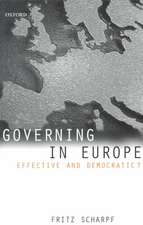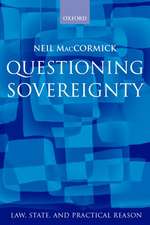Struggling for a Social Europe: Neoliberal Globalization and the Birth of a European Social Movement
Autor Andy Mathersen Limba Engleză Paperback – 15 noi 2016
| Toate formatele și edițiile | Preț | Express |
|---|---|---|
| Paperback (1) | 338.33 lei 43-57 zile | |
| Taylor & Francis – 15 noi 2016 | 338.33 lei 43-57 zile | |
| Hardback (1) | 819.90 lei 43-57 zile | |
| Taylor & Francis – 28 iun 2007 | 819.90 lei 43-57 zile |
Preț: 338.33 lei
Preț vechi: 386.78 lei
-13% Nou
Puncte Express: 507
Preț estimativ în valută:
64.75€ • 67.35$ • 53.45£
64.75€ • 67.35$ • 53.45£
Carte tipărită la comandă
Livrare economică 14-28 aprilie
Preluare comenzi: 021 569.72.76
Specificații
ISBN-13: 9781138266902
ISBN-10: 1138266906
Pagini: 224
Dimensiuni: 156 x 234 mm
Greutate: 0.45 kg
Ediția:1
Editura: Taylor & Francis
Colecția Routledge
Locul publicării:Oxford, United Kingdom
ISBN-10: 1138266906
Pagini: 224
Dimensiuni: 156 x 234 mm
Greutate: 0.45 kg
Ediția:1
Editura: Taylor & Francis
Colecția Routledge
Locul publicării:Oxford, United Kingdom
Notă biografică
Andy Mathers is a Senior Lecturer in the School of Sociology, University of the West of England, UK.
Recenzii
'Andy Mathers has written a timely book. His subject is transnational mobilizing, a topic whose importance has only increased in the period since his original investigation. Anyone interested in contemporary popular protest should read and learn. The book’s argument for a class analysis of social movements needs to be heard widely amongst activists and academics alike.' Colin Barker, Manchester Metropolitan University, UK 'Based on a detailed study of the European Marches movement as a "researcher-activist", Andy Mathers provides a powerful class analysis of contemporary social movements. He puts labour right at the heart of resistance to neo-liberal globalisation, exactly where it should be. A must-read for all critical academics, progressive trade unionists and social movement activists alike.' Andreas Bieler, University of Nottingham, UK '...a theoretically informed, empirically detailed and systematically analyzed account, written by a self-reflective academic involved in the movement he is studying. It is also a well-written story which, whilst optimistic, is snesitive to contradictions both around and within his movement.' Journal of Contemporary European Studies
Cuprins
Acknowledgments; Chapter 1 Introduction: Struggling for a Social Europe; Chapter 2 The Decline of Labour and the Rise of the New Social Movements in the Work of the New Social Democratic Left; Chapter 3 Investigating the Struggle for a Social Europe; Chapter 4 Protesting Europe: the European Marches to Amsterdam, Cologne and Nice; Chapter 5 A Europe of Citizens; Chapter 6 A Different Europe; Chapter 7 The European Marches, Social Europe, and the Limits of the New Reformism; Keep on Struggling for a Social Europe!;
Descriere
Protests at summit meetings have inspired intense debate over the nature and significance of the 'anti-globalization' movement. However, the European dimension of this movement is still largely unknown. In this insightful book Andy Mathers addresses this deficit through a discussion of events that have marked the birth of a new European social movement. Offering a critical engagement with key thinkers such as Pierre Bourdieu, Mathers relates the development of the movement to economic, employment and welfare state restructuring along neoliberal lines. In doing so he challenges received ideas about the nature of contemporary collective action and the character of present day social movements.



















